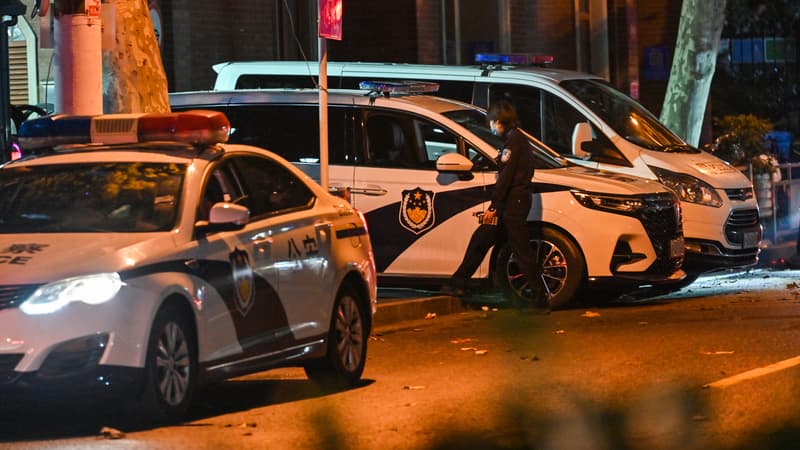China’s top security body called for a “crackdown” on Tuesday against “hostile forces,” two days after protests against health restrictions and for more freedoms than seen since 1989.
The police presence in the streets prevented for the moment any new concentration.
London has also summoned the Chinese ambassador to the United Kingdom, Zheng Zeguang, after the arrest this Sunday of a BBC journalist who was covering the protests in Shanghai, British Foreign Secretary James Cleverly has announced.
The Political and Legal Affairs Commission of the ruling Communist Party, which oversees law enforcement in the country, said it was “necessary to suppress the infiltration and sabotage activities of hostile forces in accordance with the law,” according to the report. a meeting, broadcast by the state agency New China.
Anger at the country’s health policy
The text considers it crucial to “resolutely repress criminal actions that seek to break the social order, and resolutely protect social stability.”
In Beijing, the National Health Commission pledged to “accelerate the increase in the vaccination rate for people over 80 years of age and continue to increase the vaccination rate for people 60 to 79 years of age.”
The insufficient vaccination rate in China, particularly among the elderly, is one of the arguments put forward by the government to justify its strict health policy, with repeated confinements, quarantines upon arrival from abroad and almost daily tests on the population.
In force for almost three years, this policy was the target of demonstrations this weekend in several cities, the most widespread protest movement since the bloody suppressed pro-democracy mobilizations in 1989.
Clashes in several cities of the country
Also in the background, deep frustrations with the political system as evidenced by the slogans chanted by the crowd, some demanding the resignation of President Xi Jinping and the departure of the Communist Party in power.
The trigger: a deadly fire last week in Urumqi, capital of the Xinjiang region (Northwest). Sanitary restrictions are accused of having prevented the work of lifeguards, arguments swept up by the government on Monday.
After a turbulent weekend, large police deployments in the country’s major cities appeared to have deterred protesters on Tuesday, according to AFP journalists in Beijing and Shanghai.
In Beijing, AFP reporters saw some police vehicles, but no protesters, at the crossroads near the Asian Games Village, where a protest had been planned. The frigid temperatures of minus nine degrees Celsius had certainly helped discourage further gatherings. Participants in the weekend protests in the Chinese capital said Monday they had received phone calls from police asking for their whereabouts.
The scope of the survey difficult to estimate
Frustration with the “zero Covid” policy was still palpable. “The (zero Covid) policy is really too strict,” said a 17-year-old bystander in Shanghai, who wished to remain anonymous. “It kills more people than Covid.”
Some, however, managed to gather on Tuesday night, especially in Hong Kong, rocked in 2019 by pro-democracy demonstrations, where dozens of people paid tribute, at the Chinese University, to the victims of the Urumqi fire.
In the nearby mainland Chinese city of Shenzhen, witnesses said they saw a heavy police presence downtown following rumors on social media of calls for protests, with some 150 police officers and dozens of vans in the Huaqiangbei neighborhood.
The authorities’ strict control over information and health restrictions on travel within the country make it difficult to estimate the total number of protesters over the weekend. But such a widespread uprising is extremely rare in China, given the crackdown on any form of opposition to the government. It immediately caught the attention of the international community.
A crisis followed by Westerners
US President Joe Biden said he was “in the know.” Secretary of State Antony Blinken stressed that the US position was “the same everywhere” and was “to support the right of people to protest peacefully to express their opinions, their concerns and their frustrations.”
In the United States, the Chinese and Uyghur communities (in Xinjiang) held vigils in tribute to the victims of the excesses of the Covid zero policy.
“The authorities use covid as an excuse, but they use strict lockdowns to control the Chinese population,” said a 21-year-old Chinese participant who gave only her last name, Chen.
If Beijing maintains its strict anti-Covid policy for the moment, some relaxation gestures have appeared in recent days.
In Urumqi, residents were able to travel by bus again this Tuesday to do their shopping, after weeks of confinement in this city of four million inhabitants. The city of Beijing has banned “the practice of blocking building doors in gated residential complexes,” according to the New China news agency, a move that has fueled popular anger.
Source: BFM TV


